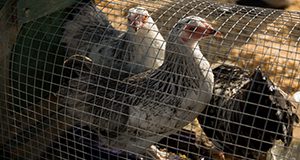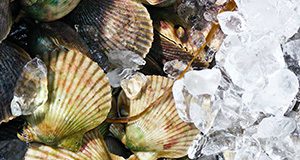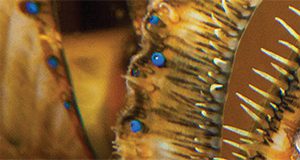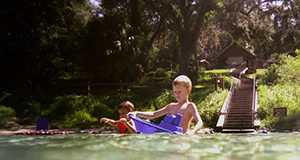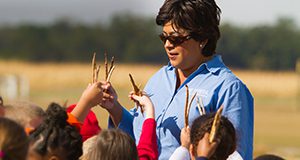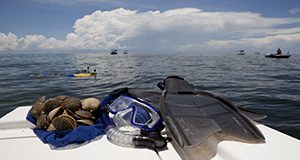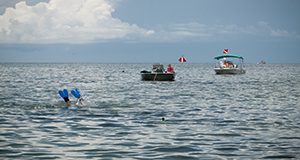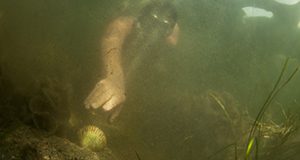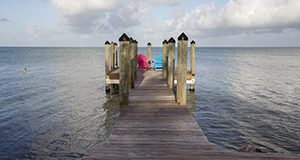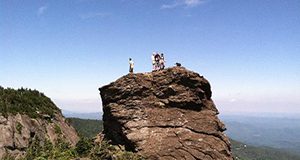Raising backyard chickens is an increasingly popular way to explore self-sufficiency, connect with how our food is produced, and gain experience for future dabbling in food production. This 13-page publication is designed primarily for those considering raising backyard chickens for eggs for personal consumption. Written by Mary E. Henry, Jessica M. Ryals, Alicia Halbritter, and Derek L. Barber, and published by the UF/IFAS Department of Animal Sciences, revised November 2019.
http://edis.ifas.ufl.edu/an239
Category: Recreation
Best Practices for Scalloping: From the Boat to Your Plate
Recreational scalloping in Florida is a popular group activity for many residents and visitors throughout the summer months. This 6-page fact sheet written by Brittany Hall-Scharf, Sarah Ellis, and Savanna Barry and published by the UF/IFAS Florida Sea Grant College Program lists the legal requirements for boating and scalloping, provides a safety plan to minimize and/or prevent accidents while you’re out on the water, and explains proper shucking methods to ensure that the meals you make from your catch will be safe and delicious.
https://edis.ifas.ufl.edu/sg158
Recreational Harvesting of the Florida Bay Scallop: Wakulla County
This handy brochure includes a full-color map identifying access routes to the boat ramps and marinas in Wakulla County, plus the latest information on scallops and scalloping, the recommended equipment you will want to bring, and a few tasty recipes for preparing Florida’s best summertime catch. Written by Savanna Barry and published by the UF/IFAS Extension Florida Sea Grant College Program.
http://edis.ifas.ufl.edu/sg149
Swimmer's Itch (Cercarial Dermatitis)
Learn how to swim safely and avoid this itchy skin rash in this 3-page document written by Emma N. I. Weeks and Katherine Sayler and published by the UF/IFAS Department of Entomology and Nematology.
http://edis.ifas.ufl.edu/in1200
Florida's Agritourism Laws
Agritourism combines tourism and agriculture, Florida’s two largest industries, to provide interactive, engaging, and educational experiences for the public. This four-page document describes the laws governing Florida agritourism operations. Written by Mary Beth Henry and Kathryn Stofer and published by UF’s Department of Agricultural Education and Communication, September 2017.
http://edis.ifas.ufl.edu/wc285
Recreational Harvesting of the Florida Bay Scallop: Citrus County
This publication includes a full-color map identifying access routes to the boat ramps and marinas in Citrus County near Homosassa and Crystal River, plus the latest information on scallops and scalloping, the recommended equipment you will want to bring, and a few tasty recipes for preparing Florida’s best summertime catch. Written by Savanna Barry and published by the Florida Sea Grant College Program.
http://edis.ifas.ufl.edu/sg147
Recreational Harvesting of the Florida Bay Scallop: Steinhatchee and Keaton Beach areas, Taylor County
A full-color map identifying access routes to the boat ramps and marinas in southern Taylor County near Steinhatchee and Keaton Beach, plus the latest information on scallops and scalloping, the recommended equipment you will want to bring, and a few tasty recipes for preparing Florida’s best summertime catch. Written by Victor Blanco and published by the Florida Sea Grant College Program.
http://edis.ifas.ufl.edu/sg146
Recreational Harvest of the Florida Bay Scallop: Hernando County
A full-color map identifying access routes to the boat ramps and marinas in Hernando County, plus the latest information on scallops and scalloping, the recommended equipment you will want to bring, and a few tasty recipes for preparing Florida’s best summertime catch. Written by Brittany Hall-Scharf and published by the Florida Sea Grant College Program.
http://edis.ifas.ufl.edu/sg148
Coral Reef Conservation Strategies for Everyone
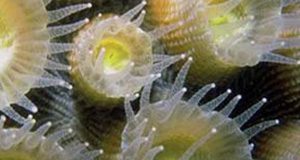
Corals are small animals related to jellyfish. Large groups of these animals live together and form huge interconnected colonies called reefs. Coral reefs are some of the most diverse ecosystems on the planet; an essential habitat for a wide variety of animal and plant species. About 400 million people rely on coral reef fish as a source of protein; about 6 million people make a living by catching and selling coral reef fish and invertebrates; tourism activities like SCUBA diving and snorkeling provide revenue of US$9.6 billion per year; and reefs reduce wave energy by 97%, helping to protect 197 million people in coastal areas from beach erosion, wave energy, and flooding. Learn how you can help protect these fragile, essential ecosystems from threats in this 7-page fact sheet written by Kathryn E. Lohr and Joshua T. Patterson and published by the Program in Fisheries and Aquatic Sciences, School of Forest Resources and Conservation.
edis.ifas.ufl.edu/FA199
Planning for Recreational Waterway Access in Rural Coastal Settings
Increasing demand for waterfront land throughout the United States is a long-term trend with a profound impact on the public's ability to access coasts and waterways for recreation. Overcrowding at beaches, boat ramps, and popular destinations in Florida's densely populated coastal areas leads more Floridians and tourists to consider recreating in rural coastal communities that still offer the solitude and natural settings desired by many. According to a recent report sponsored by the Outdoor Industry Association, the provision of public water access has increased outdoor recreation tourism, which could bring much-needed economic benefits to rural areas. However, many of these communities lack planning resources to measure local support and user needs and to estimate the benefits that investments in public-access infrastructure might bring. This 6-page fact sheet written by Corina Guevara, Charles Sidman, Robert Swett, and Alan Hodges and published by the Florida Sea Grant College Program describes an approach those communities can use to characterize user needs and to quantify local economic benefits derived from public-access infrastructure with a focus on boat ramp facilities.
http://edis.ifas.ufl.edu/sg141
Trails, Bridges, and Boardwalks
Trails represent a landowner’s main routes for recreational activities such as walking, sightseeing, horseback riding, and bicycling. They provide access to, and through, forest land and other natural resources. They play an important role in protecting and preserving soil, water, and wild plants and animals. They can be the source of endless hours of enjoyment and relaxation. This 13-page fact sheet written by Alan Long, Anne Todd-Bockarie, Taylor Stein, Keith Bettcher, and Chris Demers and published by the School of Forest Resources and Conservation will help you plan your trails wisely and construct them carefully so that you and your guests can enjoy them to the fullest.
http://edis.ifas.ufl.edu/fr401
How Do I Legally Sell Meat from Alligators, Wild Game, or My Farmed Game or Birds in Florida?
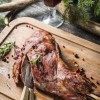 Game meats provide wholesome and nutritious animal protein, but learning the regulations (and which agency has jurisdiction over which regulations) can be burdensome for those who want to be entrepreneurial. This 4-page fact sheet is a “one-stop-shop” for Florida residents who want to sell products from alligators, wild game, or their own farmed game or birds. Written by Chad Carr, Jason Scheffler, Larry Eubanks, Ron Webb, Lee Cornman, Scotland Talley, and Steve Stiegler, and published by the UF Department of Animal Sciences, December 2014. (Photo: iStock/Thinkstock.com)
Game meats provide wholesome and nutritious animal protein, but learning the regulations (and which agency has jurisdiction over which regulations) can be burdensome for those who want to be entrepreneurial. This 4-page fact sheet is a “one-stop-shop” for Florida residents who want to sell products from alligators, wild game, or their own farmed game or birds. Written by Chad Carr, Jason Scheffler, Larry Eubanks, Ron Webb, Lee Cornman, Scotland Talley, and Steve Stiegler, and published by the UF Department of Animal Sciences, December 2014. (Photo: iStock/Thinkstock.com)
http://edis.ifas.ufl.edu/an315
Maps of Charlotte County General Permit Trafficshed Channels and Secondary Channels
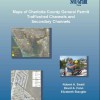 This 33-page collection of maps depicts channels included in the Charlotte County General Permit (GP)1. Each map shows either channel segments within a GP trafficshed or segments in a GP secondary channel system. Written by Robert A. Swett, David A. Fann, and Elizabeth Staugler, and published on EDIS by Florida Sea Grant, October 2014.
This 33-page collection of maps depicts channels included in the Charlotte County General Permit (GP)1. Each map shows either channel segments within a GP trafficshed or segments in a GP secondary channel system. Written by Robert A. Swett, David A. Fann, and Elizabeth Staugler, and published on EDIS by Florida Sea Grant, October 2014.
http://edis.ifas.ufl.edu/sg133
The Economic Impact of the 2011 Florida BASS Federation Tournament to Osceola County and the Event's Economic Value to Participants (FE916)
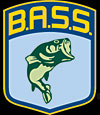 The Florida BASS Federation Nation is a chapter of a national organization whose goal is to stimulate public awareness of bass fishing as a major participant sport. Each the state Championship tournament attracts anglers to a competitive event in which participants seek to catch the largest cumulative weight of bass over two days. This article describes an assessment of the economic impact in Osceola County associated with the State Championship tournament. Findings from this analysis should help planners and other stakeholders of similar tournaments better estimate the economic benefits associated with such community activities. This 9-page fact sheet was written by Sherry Larkin, Jessica Georges, Alan Hodges, Michael Allen, and Dale Jones, and published by the UF Department of Food and Resource Economics, October 2012.
The Florida BASS Federation Nation is a chapter of a national organization whose goal is to stimulate public awareness of bass fishing as a major participant sport. Each the state Championship tournament attracts anglers to a competitive event in which participants seek to catch the largest cumulative weight of bass over two days. This article describes an assessment of the economic impact in Osceola County associated with the State Championship tournament. Findings from this analysis should help planners and other stakeholders of similar tournaments better estimate the economic benefits associated with such community activities. This 9-page fact sheet was written by Sherry Larkin, Jessica Georges, Alan Hodges, Michael Allen, and Dale Jones, and published by the UF Department of Food and Resource Economics, October 2012.
http://edis.ifas.ufl.edu/fe916
Recreational Harvesting of the Florida Bay Scallop, Citrus County (SGEF187/SG102)
 Scalloping is a favorite summer pastime along the central west and northwest coasts of Florida. This publication offers a brief biology lesson on bay scallops along with everything you need to know about scalloping—legal requirements, equipment needed, how to collect and handle scallops, recipes, and information on scallop research and restoration. The brochure also includes a boat ramp and marina locator map for the Citrus County area. Written by Don Sweat and Fred Vose, and published by the UF Department of Sea Grant, June 2011.
Scalloping is a favorite summer pastime along the central west and northwest coasts of Florida. This publication offers a brief biology lesson on bay scallops along with everything you need to know about scalloping—legal requirements, equipment needed, how to collect and handle scallops, recipes, and information on scallop research and restoration. The brochure also includes a boat ramp and marina locator map for the Citrus County area. Written by Don Sweat and Fred Vose, and published by the UF Department of Sea Grant, June 2011.
http://edis.ifas.ufl.edu/sg102
Catch-and-Release: Things You Can Do to Help Saltwater Fish Survive (SGEF168/SG096)
This 2-page guide offers tips on how you can properly handle and release saltwater fish. This also includes new Gulf reef fishing gear requirements implemented June 1, 2008. Written by Steve Kearl and Lee Schlesinger and published by the UF Sea Grant Program, May 2008.
http://edis.ifas.ufl.edu/sg096
How to Develop a Marketing Plan for Your Ecotourism Business (FOR278/FR340)
Ecotourism is often seen as a simple business for landowners to begin because little infrastructure is needed; however, certain management skills are needed to effectively operate an ecotourism business. A key business skill is the ability to market one’s ecotourism product or service effectively. This 7-page fact sheet describes the contents of a marketing plan and presents external resources to assist in ecotourism operation marketing. Written by Tinelle D. Bustam and Taylor Stein, and published by the UF Department of School of Forest Resources and Conservation, December 2011.
http://edis.ifas.ufl.edu/fr340
Integrating Sustainability into Your Ecotourism Operation (FOR277/FR339)
Despite ecotourism’s promotion of sustainable practices and principles, the potential for negative impacts are great in sensitive, nature-based areas such as protected, conserved, and private lands. This 5-page fact sheet provides insight on sustainability practices that could be integrated into ecotourism operations to minimize negative impacts and ensure long-term protection of vital resources. Written by Tinelle D. Bustam and Taylor Stein, and published by the UF Department of School of Forest Resources and Conservation, December 2010.
http://edis.ifas.ufl.edu/fr339
WC094 Digital Photography and Photographic Editing
WC094, a 4-page illustrated fact sheet by Ricky Telg, is first in a three-part series that offers tips on taking good digital photos and addresses the basics of digital photography. Includes references. Published by the UF Department of Agricultural Education and Communication, July 2010.
http://edis.ifas.ufl.edu/wc094
FOR237/FR299 Principles for Developing Your Ecotourism Business Plan
FOR237, a 6-page fact sheet by Tinelle D. Bustam and Taylor Stein, provides those wishing to begin an ecotourism business or modify an existing business with a detailed description of the diversity in ecotourism business models and the components necessary to develop an ecotourism business plan. Includes references. Published by the UF School of Forest Resources and Conservation, May 2010.
http://edis.ifas.ufl.edu/fr299
